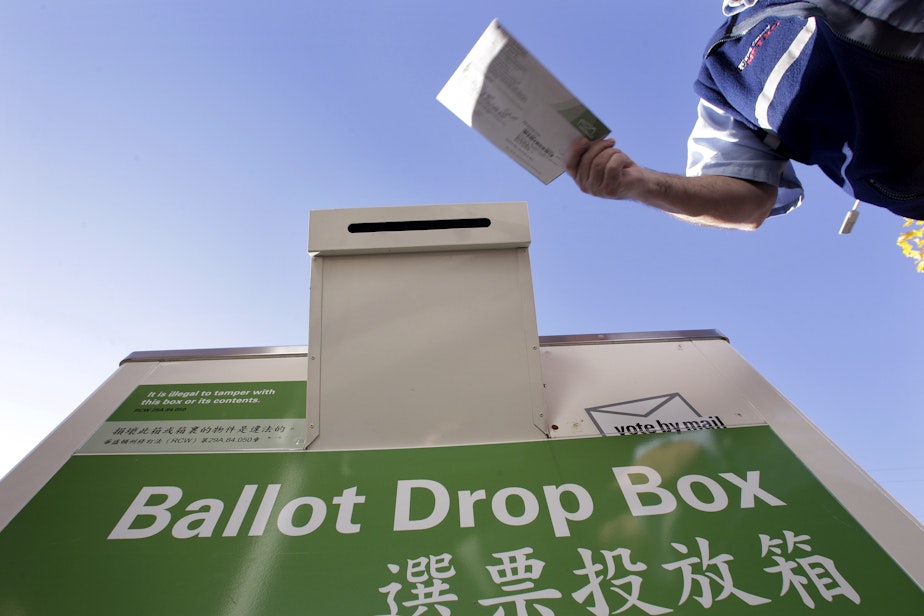5 step guide: How to vote in Washington's primary

With the Iowa caucuses over, the presidential race now speeds up. Washington state will vote on the candidates March 10.
Washington state's primary is much earlier this year than in the past. Both major political parties will use the results to choose a nominee.
In previous years, the parties have used a mix of the caucus and primary results. Here's a short guide on Washington's presidential primary.
1. When do Washington and other states vote?
With Iowa Caucuses over, three more states will hold primaries/caucuses in February, then 14 states vote on Super Tuesday, March 3.
March 10 is Washington state's presidential primary. Some are calling it "Little Tuesday" since it's one week after Super Tuesday, and because multiple states will vote, including Washington and Michigan that have a high delegate count.
Lawmakers moved up the presidential primary intentionally to give Washington a higher status in choosing nominees. It was previously held in May (the Democratic caucuses were earlier in 2016, though, on March 26).
2: Does it matter that Washington's primary is earlier this year?
The candidate field is still big, where in previous years Washington's caucuses and primary were held later in the game. At that point, the front-runner(s) was already clear.
Since it's earlier in the process the state is getting a lot more attention. Washington had a half-dozen candidate visits before the primary season was underway. Candidates are holding public events, shaking hands, taking photos, and showing up in Seattle bars, where previously Washington was more of an "ATM state" where candidates only visited to raise money.
Here's how our state's Democratic Party Chair, Tina Podlodowski, puts it.
"The weekend prior to the March 10 primary ... we anticipate that the presidential candidates will all be there.
"So I think Washington state, by virtue of moving it early, will have a dramatically larger say in who the Democratic presidential nominee is."
3: How to vote
All registered voters will get mailed a ballot a couple weeks before March 10.
The primary is the same as any other Washington election except for one detail: you must declare a party.
Your ballot will list all the Democratic and Republican candidates for president. You choose one candidate, then mark on the envelope whether you're voting as a Democrat or Republican.
Your vote won't be counted unless you mark your party.
People can register to vote until Election Day.
4: Iowa had delayed results. How secure/stable is Washington's vote system?
This message is clear from Washington's elections officials -- they have no doubt that our system is safe and accurate. The reason: paper ballots.
Every ballot is hard copy (even if sent electronically, they are printed out), and they're counted on a computer system that is cutoff from the internet.
It appears the issues in Iowa stem from a voting application they used which had some issues.
Washington Secretary of State Kim Wyman says the voter database and tabulation software is tested regularly.
"The election is going to be run by our county auditors (and election director in King County), and these are professionals that know what they're doing and know how to handle large volumes," Wyman said.
Initial results are expected in Washington on the evening of March 10, then in the days that follow as more ballots are counted.
5: Are Washington voters good at picking the presidential nominee?
In other words, do we tend to vote for the person who ends up being the candidate?
There is not an easy way to decipher this, because Washington has used results from both caucuses and primary elections in the past, and both state parties chose their nominee differently (until 2020). This is the first time both major parties are using the primary results.
But in the last 10 years, Washington's primary winner has often been the person eventually nominated for their party. For example:
- 2016: Hillary Clinton won the Democratic primary
- 2012: Mitt Romney won the Republican caucuses (no state primary that year)
- 2008: Barack Obama and John McCain won the primary
- 2004: John Kerry won the Democrat primary
- 2000: Al Gore and George Bush won the primary
Of course, in those years Washington voted after most other states, so that could have influenced who people selected.
In 2016, the Washington Democratic caucus went to Bernie Sanders, though Hillary Clinton eventually won the nomination.




